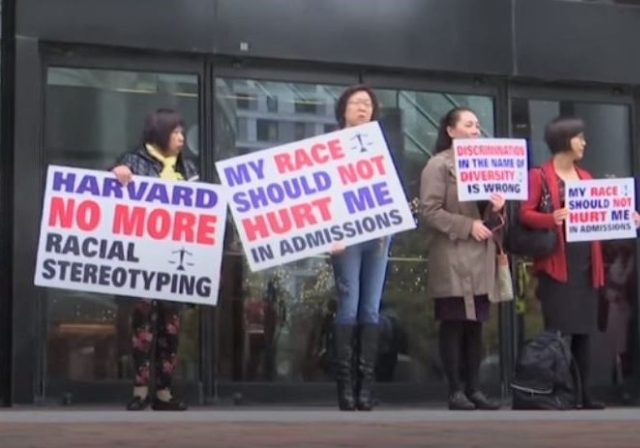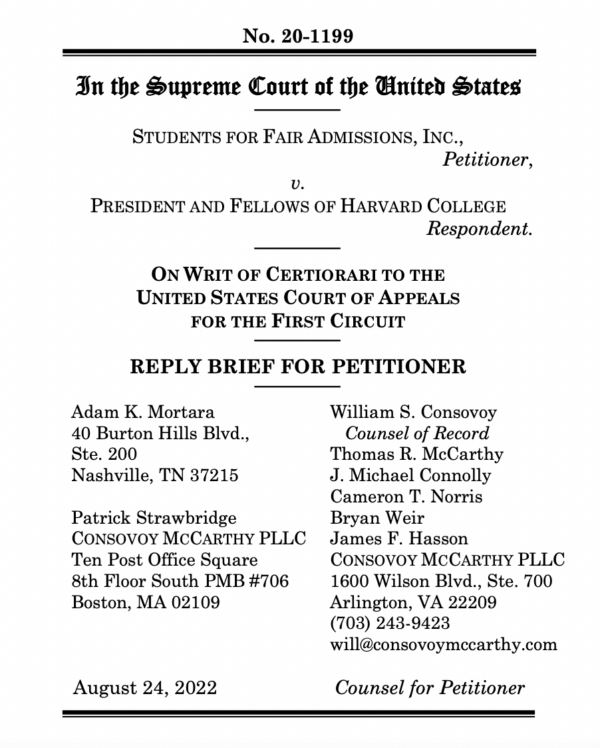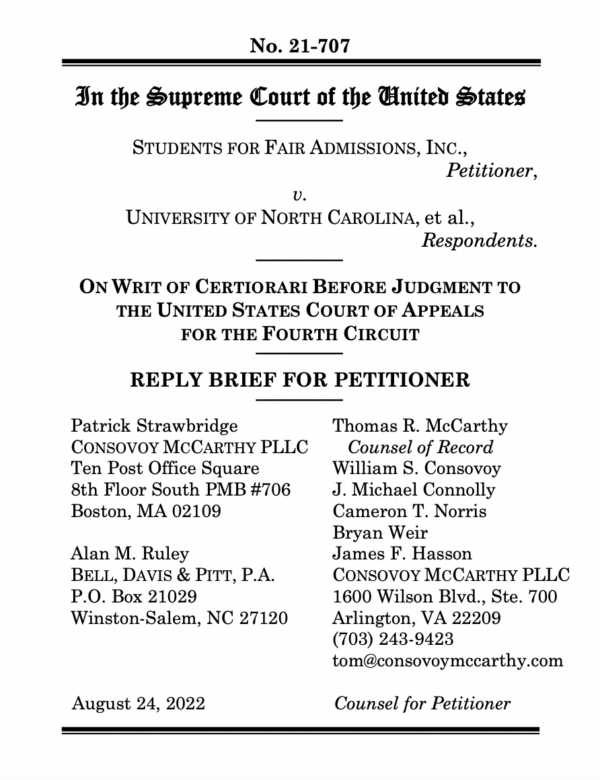SCOTUS Affirmative Action Reply Briefs: Harvard and UNC Make Arguments Similar To Segregationists
Group challenging discrimination against Asian students files Reply Briefs in Harvard and UNC cases: “Harvard uses race as a proxy for character, equates race with winning a national award, micromanages tight racial ranges, never considered race neutrality, makes no plans to stop using race…”

Petitioner filed reply briefs in the Supreme Court cases, Students for Fair Admissions v. Harvard and Students for Fair Admissions v. University of North Carolina. Basically, petitioner explains that both Harvard and UNC support racial discrimination now, racial discrimination tomorrow, racial discrimination forever. By contrast, both reply briefs support LIF’s argument in its amicus brief:
The grand judicial experiment of excusing racial discrimination in university admissions in the hope it would promote the educational objective of diversity of viewpoint has failed, and accordingly, this Court should overrule or modify its holding in Grutter v. Bollinger, 539 U.S. 306 (2003) (“Grutter”). Despite the Court permitting the use of race in higher education admissions, viewpoint diversity is increasingly endangered on campus.
Naturally, the reply briefs address other legal issues besides, such as standing and the importance of stare decisis (that is, the importance of not overruling prior decisions so as to maintain predictability).
Here are some the highlights of the reply brief against Harvard:
Harvard used to boast that it was this Court’s “model” for how to use race. E.g., BIO.15. It no longer makes that point. Harvard was the model; it just never deserved to be. Once the “Harvard Plan” was challenged in court, litigation revealed that Harvard uses race as a proxy for character, equates race with winning a national award, micromanages tight racial ranges, never considered race neutrality, makes no plans to stop using race, and more. If the Court knew how universities would abuse the limited license it was granting them in 2003, Grutter would have come out the other way.
***
Surely Harvard doesn’t think that Brown [v. Board of Education] would have been different if southern schools had used a holistic policy that covertly reduced the number of black students (as Harvard did with Jewish students). The rule of racial neutrality is “offended by ‘sophisticated as well as simple-minded modes of discrimination.’” United States v. Fordice, 505 U.S. 717, 729 (1992)…
4. No educational benefits could justify departing from Brown, especially not Grutter’s imaginary benefits. When Grutter discussed the educational benefits of diversity, it meant a diversity of viewpoints. Br.65. Yet Harvard concedes that race says nothing about an applicant’s views, experiences, or background. Harv.- Br.33. Common sense, plus this Court’s precedents, agree. Br.52-53. But if race is no better than random, why use race?
Neither Harvard nor Grutter fills this logical gap with evidence. The district court in Grutter found that the “connection between race and viewpoint” is “tenuous, at best.” 137 F. Supp. 2d 821, 849 (E.D. Mich. 2001). Witnesses “generally conceded” that viewpoints expressed by minority students “might equally have been expressed by non-minority students.” Id. at 849-50. A former dean of Michigan Law agreed, noting the faculty’s consensus that “racial diversity is not responsible for generating ideas” in class even on questions of race. Id. at 850. The studies in Grutter and Harvard’s brief are equally unimpressive. They concede that racial diversity “does not directly contribute to student development.” Bowman, College Diversity Experiences and Cognitive Development: A Meta-Analysis, 80 Rev. Educ. Res. 4, 5-6 (2010). So these studies proceed to measure something other than racial diversity, like taking an ethnic-studies class or socializing with minorities. Grutter v. Bollinger, 288 F.3d 732, 804 (6th Cir. 2002) (en banc) (Boggs, J., dissenting). Even on those variables, the studies aren’t causal, and they rely on highly unscientific surveys. Id.; Killenbecks-Br.17-19…
Harvard’s arguments also assume that it’s diverse now. But it’s not socioeconomically, geographically, or politically…
While Grutter also cited an amicus brief touting the importance of race to the military, 539 U.S. at 331, the United States opposed race-based admissions in Grutter, U.S.-Grutter-Br.13-18. Those amici were wrong, General Olson explained, to suggest that “black soldiers will only fight for black officers” or that “race neutral means” wouldn’t work “in the academies.” O.A.Tr.19. The United States now supports Harvard, but it offers no evidence about how the military academies use race, what race-neutral alternatives they’ve considered, why those alternatives wouldn’t work, or why its contrary position in Grutter was wrong. As for the ROTC, the quality of those officers won’t meaningfully change because race-neutral alternatives still achieve diversity. Even today, the United States can’t explain how officers who attend race-blind universities (say, Texas A&M) are inferior to officers who attend race-based universities (say, Texas). The military did just fine during the forty years that Harvard and other elite colleges banned ROTC from their campuses. Hayden, ROTC Marches Through the Ivy League, Atlantic (May 26, 2011), bit.ly/3TcXczi.
(footnote omitted) (emphasis added).
In a footnote, SFFA also said it never conceded that “diversity” provides educational benefits:
And here are some highlights of the reply brief against the University of North Carolina:Harvard pretends that SFFA conceded the benefits of diversity below. But diversity wasn’t “‘on trial,’” Harv.-Br.11, because Harvard got SFFA’s challenge dismissed on the pleadings, stressing that the benefits of diversity were “not appropriate topics for litigation” because only this Court can overrule Grutter.
UNC’s argument is not with SFFA; it is with Brown. That landmark decision fulfilled the Fourteenth Amendment’s promise by requiring that “education… be made available to all on equal terms.” 347 U.S. 483, 493 (1954). As the United States explained then, no neutral principle “could support a constitutional distinction between universities on the one hand, and public elementary or high schools on the other.” U.S.-Brown-Br.19. Yet Grutter draws just that distinction.
In defending Grutter’s detour from Brown, UNC makes the same arguments that Brown rejected. It claims that the postbellum era vindicates its reading of the Fourteenth Amendment. It argues that racial classifications make everyone better off. It warns that universities cannot discard race quite yet. And it contends that the legality of its practices should be decided by North Carolinians, not this Court. The segregationists agreed.
***
3. The educational benefits of diversity are not a “‘most compelling’” reason to use race. UNC does not defend Grutter’s stereotypical assumption that racial diversity increases viewpoint diversity. Though UNC parrots Grutter’s more race-specific assertions, it does not rehabilitate them.
Like Grutter, UNC’s arguments are mostly circular. It says racial diversity prepares students for the “increasingly diverse communities and workplaces that await them.” JA1378; accord Grutter, 539 U.S. at 331. It says racial diversity creates “legitimacy in the eyes of the citizenry” by ensuring that elite colleges are “visibly open” to all races. Grutter, 539 U.S. at 332 (emphasis added). And it says racial diversity helps minority students “not feel isolated.” Id. at 319. These interests come dangerously close to saying that racial diversity is important because it achieves racial diversity. At a minimum, they betray a focus on proportional representation—ensuring that the student body “looks like” the country more broadly. How else would universities match the workplace, meet society’s aesthetic expectations, or prevent minorities from feeling unusually isolated? Neither proportional representation nor racial diversity in a vacuum, however, are legitimate interests that can sustain race-based admissions. Parents Involved, 551 U.S. at 729- 33.
Also like Grutter, UNC has no real evidence that race-based admissions “promot[e] ‘cross-racial understanding.’” 539 U.S. at 330. Touting its own report—a citation-free document created for litigation—UNC asserts that racial diversity will “destroy stereotypes, bridge divisions, and promote empathy.” JA1378. But even if racial diversity created these benefits, UNC’s “‘means’” of pursuing racial diversity counteracts them. Parents Involved, 551 U.S. at 743 (plurality). Racial classifications increase “‘racial hostility,’” create “‘conflict,’” and “‘reinforce’” stereotypes. Id. at 746. Tellingly, the only evidence that tries to measure whether race-based admissions create these benefits is pseudoscience. As in Grutter, UNC proffers surveys that ask students to grade their own appreciation for other races. JA1524. These surveys suffer from considerable “‘social desirability pressures’” where students feel pressured to say what the university wants to hear. Killenbecks-Br.17. And these “subjective self-reports” are not the hard evidence that strict scrutiny demands. Grutter v. Bollinger, 288 F.3d 732, 804 (6th Cir. 2002) (en banc) (Boggs, J., dissenting). The same goes for the intervenors’ evidence about “white fragility.” JA1618-20.
 DONATE
DONATE
Donations tax deductible
to the full extent allowed by law.










Comments
They make the same arguments as segregationists because they have not changed in heart or mind since their predecessors made those previous arguments.
If anything their racist viewpoints have deepened, hardened and spread.
Would that not make it systemic racism?
It also sounds institutional, does it not?
Speaking of institutions, how is the cancer treatment coming along.at the hospital institution? You indicated yesterday that you are still battling it and I wanted to encourage you in your fight. I sincerely hope everything is going well.
MrPeabody: I had my 7th of 25 proton beam treatments this morning. So far, I am not feeling any bad effects, and life goes on. I am reconciled that the cancer I have has a 50/50 chance of spreading. If it does, and goes someplace nasty like the stomach, lower intestines, or the brain I will find a means to… let me put it this way: not have to treat it. (And to the religious: spare me your “all life is sacred” stuff. It isn’t when you are tied to machines.)
Meantime, life goes on. Piano practice, fooling around with smart home stuff, etc.
Thank you for the update. I hope you live a long and healthy life.
Okay, I’ll spare you the religious stuff. But believe in God just in case. For whosoever shall call upon the name of the Lord shall be saved.
Sure, within the systems / institutions controlled by racists such as higher education.
Um, that makes no sense, since they do not descend from the people you are calling their “predecessors” in any relevant way. The segregationists of the past were white supremacists; the modern segregationists are black supremacists. Their predecessors were not the old segregationists but their rivals.
They use the same arguments not because they’re the same people, but because the way they see race is the same, and those are the arguments that make sense to someone who sees race that way.
It’s like the Calabrian and Sicilian mafias. They don’t descend from a common ancestor, and they have no connection with each other, but if each were required to defend itself in debate, it would use the same arguments because they’re in the same position, so the same arguments work for both.
Or consider a kingdom. King A makes arguments that amount to “people ought to respect and obey the king, and pay their taxes”. Then his bitter rival B comes along, topples A, and puts himself on the throne. He now makes the exact same arguments. Not because he’s really A in disguise, but because he’s king now, and those are the arguments that support the king.
There is an ideological match with the past, said match being that the Seccessionists were basically almost all Democrats. Those splitting our country on racial lines are today almost all Democrats. They have been infused with the later Marxist ideology too, but just as they were in 1860, they are now TWANLOC.
Subotai Bahadur
That doesn’t change the fact that they are not the same people, so it’s absurd to claim they “have not changed”.
It’s curious how diversity is so very important to these universities except when it comes to conservatives. It would seem they want to expose their students to all kinds of viewpoints and cultures except for those that are conservative.
Nope. They don’t value diversity of viewpoint at all. Not just conservatives; any viewpoint that’s different from theirs. The word “diversity”, in their vocabulary, refers only to race — and even then it doesn’t actually mean “diversity”, it means “fewer white people”. To them a 100% black student body would be the most “diverse” ever.
True…The “Party Line” can be violated from either side. The ever changing definitions of words and their usage help determine who is truly in sync with the Party. There is the new eugenics as you mention…purity of “their” race or their beliefs as a measure of diversity. Under the new white sheets are black skins. A new aparthied.
Sir, how DARE you suggest we don’t have diversity at our companies!!!
We have white people from Ivy Leagues, black people from Ivy Leagues, Asians from Ivy Leagues, and Hispanics from Ivy Leagues!!!
Would you like another sharp kick to the groin, Mr. King?
“Equity” IS racism, and the left is, was, and apparently, always will be racists.
Racists with a good dose of projection, that is.
King was and would be on their side in this. He preached a nice sermon about race neutrality, but he didn’t believe it.
There is no such thing as allegedly laudable or benign racial discrimination, no matter how many creative euphemisms the Dumb-o-crats may invoke to characterize such practices. It’s long overdue for SCOTUS to recognize this fact.
Roberts has painted himself into a corner on this one. “The way to stop discrimination based on race is to stop discriminating based on race.” Pretty unequivocal.
Should be amusing when he tries to backpedal, to spin however possible to maintain his membership in the DC cocktail party circuit, which seems his overriding motivation in all things
Harvard is advancing the woke agenda in the form of defending affirmative action for less qualified students and quotas against more qualified students
Asians are in fact a bit smarter on the average than even whites, measurable but not noticeable except at the extremes. The extreme is where admissions happen, though. When you’re three standard deviations out, it matters a lot where the mean is to what sort of population you find there. No blacks, 30% whites and 70% East Asians.
It’s not segregation in the classical sense to try to “remedy” that, it just redefines what the university is. If they think blacks will do as well as others, that’s just delusional unless “well” is hugely redefined.
Where that happens, some other school will have to take over the role of being a good school, is all. The previous good school is now a kindergarten
The lawyers for SFFA seem to have failed to make the point that in many of these “diverse” colleges – and diversity is supposed to result in greater harmony, empathy, etc., etc.) – there is a significant movement towards racial segregation of such things as housing, graduations, introductory ceremonies, and so forth. That flies in the face of the arguments Respondents’ lawyers are making. It wouldn’t be hard to research this issue.
Harvard is using same playbook that they used to solve their “Jewish Problem” in the 1920s. Affirmative action to promote diversity. Back then, the diversity scam was geographic, White Christian Males from Upper Mid-West vs Jews from North East. IIRC, they also used the character argument, Jews had bad character.
The “Jewish Problem” was identified as “Jew Privilege” and progressed through adoption of diversity [dogma], notably color blocs (e.g. “people of color”) that are equitable and inclusive. A final solution, a wicked solution, a forward-looking solution in a socially liberal (i.e. divergent) society.
Because they ARE racists and segregationists.
Robert Byrd fillibustered the freaking Civil Rights Act and they lionized him until the day he died.
I will get a raft of downticks for this, but, the 1964 Civil Rights act has grown into a monster. Barry Goldwater and others warned us about how it would be turned on its head and result in today’s quotas.
The 1965 Voting Rights Act had good intentions, but resulted in set-aside congressional districts, and the race hustlers turning voter ID into a race issue.
One of the unintended consequences of The Voting Rights Act, the minority-majority district. Such a district, say the Congressional District Gwen Moore holds in Milwaukee. To win the seat, she needs to appeal to a Black majority electorate, over other Black candidates. By the time the winner becomes Black enough to win the district, they are too extreme to win the state. Very few Blacks have won state wide office, anywhere. They don’t need a broad appeal to win, and don’t have an appeal which goes statewide.
I don’t see any downticks.
We’ve been giving preference to certain races for 50 years. Everything regarding race has gotten worse. Here’s an idea: Treat everyone equally, outlaw any recording of race/ethnicity and all preferential treatment of race in the public and private sector. Only merit will advance society. Either we believe in equality or we don’t.
Diversity (i.e. color judgment, class-based bigotry), Inequity, and Exclusion (DIE) policy including affirmative discrimination. #HateLovesAbortion
Boils down to the “brown” paper bag” test.
When you view everything through the lens of race as the modern CRT movement does then of course you end up with racists in charge pushing segregation.